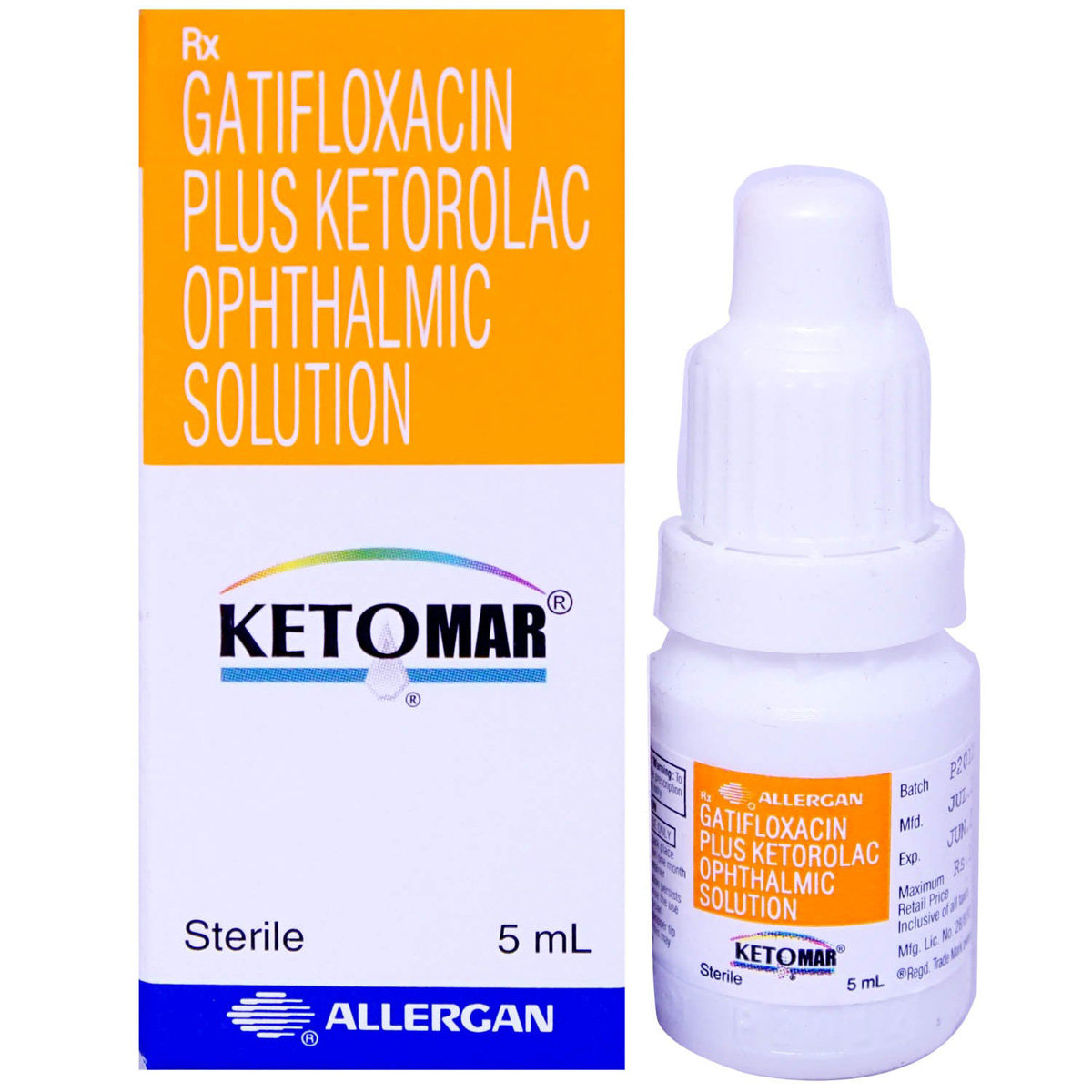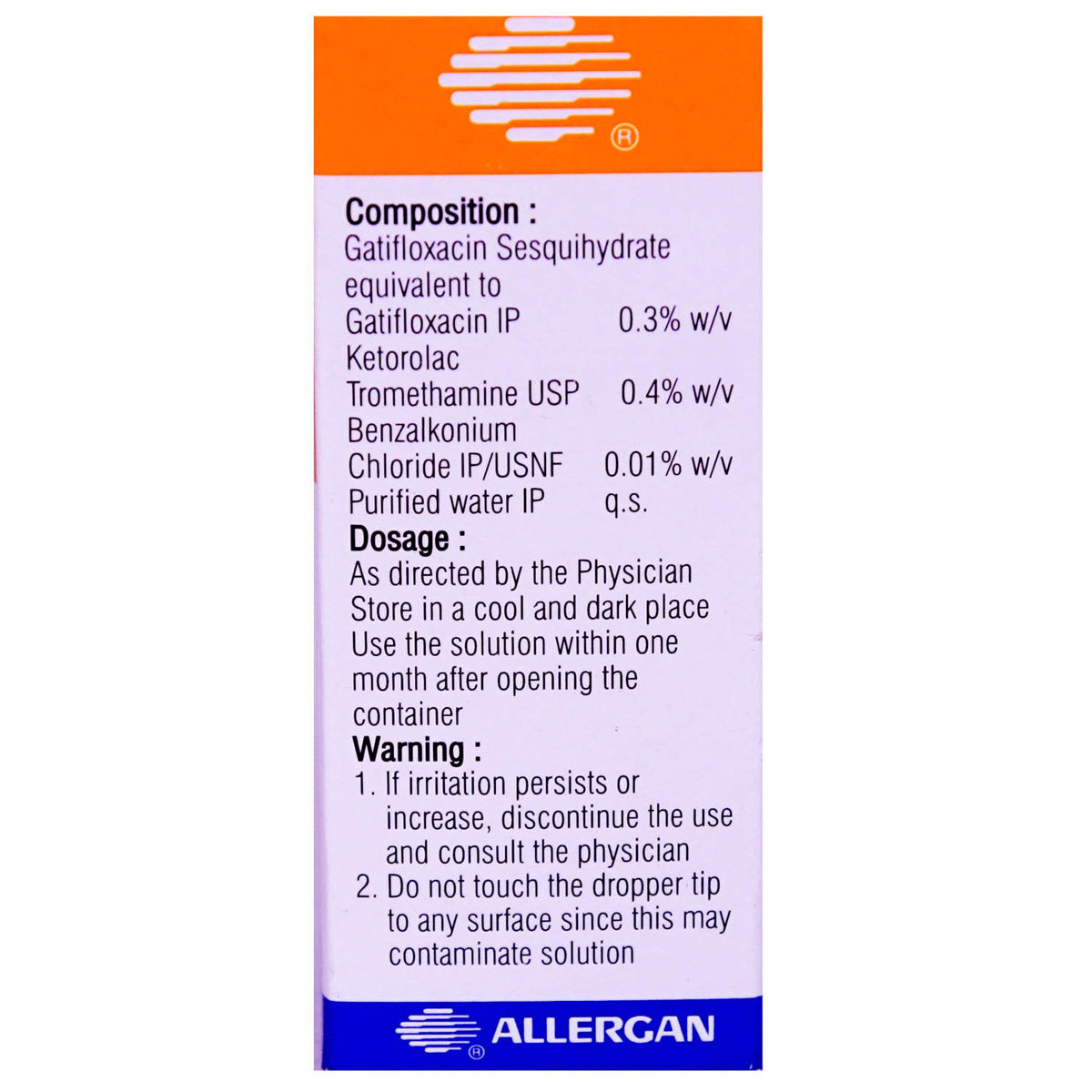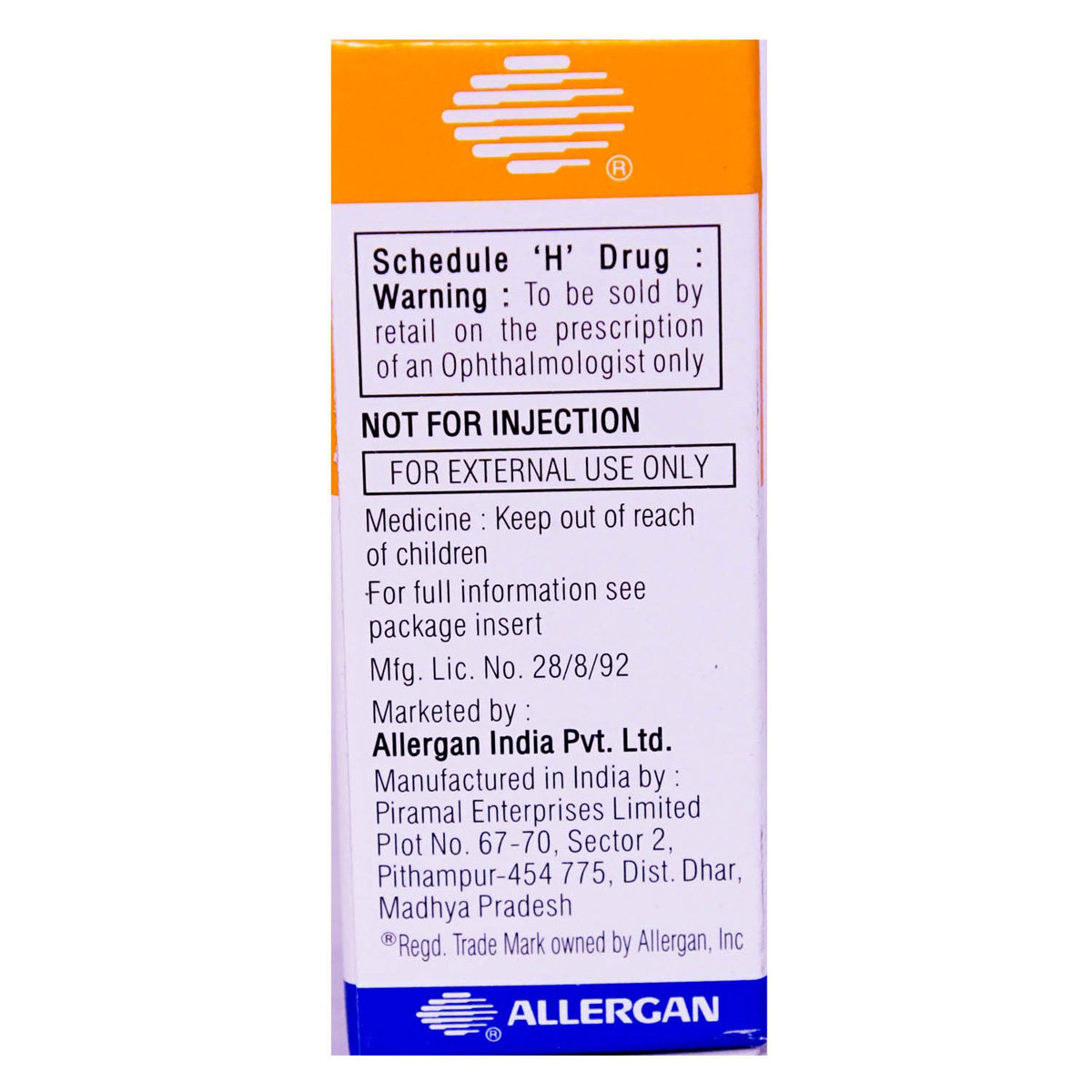Ketomar Ophthalmic Solution 5 ml
MRP ₹220.5
(Inclusive of all Taxes)
₹33.1 Cashback (15%)
Provide Delivery Location
Online payment accepted
 Prescription drug
Prescription drugWhats That
Composition :
Manufacturer/Marketer :
Consume Type :
Expires on or after :
Return Policy :
About Ketomar Ophthalmic Solution 5 ml
Ketomar Ophthalmic Solution 5 ml belongs to the ophthalmic eye medications primarily used to treat post-operative eye pain and inflammation. The eye is a very fragile organ and requires extreme care before, during and after a surgical procedure to minimize or prevent further damage. It causes some conditions like pain, redness, and swelling associated with surgeries of the eyes.
Ketomar Ophthalmic Solution 5 ml contains two medicines: Gatifloxacin and Ketorolac. Gatifloxacin is an antibiotic. It kills bacteria by preventing bacterial cell division and cell repair. Ketorolac is a non-steroidal anti-inflammatory drug (NSAID) that is a painkiller. It works by blocking the release of several chemical messengers that cause inflammation (redness and swelling) and pain in the eye. Together it relieves pain and inflammation.
Take Ketomar Ophthalmic Solution 5 ml as prescribed by your doctor. You are advised to take Ketomar Ophthalmic Solution 5 ml for as long as your doctor has prescribed it for you, depending on your medical conditions. You may experience common side effects like eye irritation, watery eyes, and a burning sensation. Most of these side effects of Ketomar Ophthalmic Solution 5 ml do not require medical attention and gradually resolve over time. However, if the side effects are persistent, reach out to your doctor.
Please do not use Ketomar Ophthalmic Solution 5 ml without consulting your doctor if you have asthma, bleeding disorders and allergic reactions to Ketomar Ophthalmic Solution 5 ml and its components. Avoid touching the dropper with bare hands or taking it closer to the eyelids while administering drops since it contaminates the dropper tip and solution. It is advised to check with your doctor before using Ketomar Ophthalmic Solution 5 ml if you are pregnant, currently breastfeeding or taking any other prescribed or non-prescribed medicines. Consumption of alcohol is not recommended during treatment with this Ketomar Ophthalmic Solution 5 ml due to the increased risk of gastrointestinal bleeding. Do not use Ketomar Ophthalmic Solution 5 ml in case of blurred vision or using any contact lens.
Uses of Ketomar Ophthalmic Solution 5 ml
Directions for Use
Key Benefits
Ketomar Ophthalmic Solution 5 ml contains two medicines: Gatifloxacin and Ketorolac belong to the ophthalmic eye medications primarily used to treat post-operative eye pain and inflammation. Gatifloxacin is an antibiotic. It kills bacteria by preventing bacterial cell division and cell repair. Ketorolac is a non-steroidal anti-inflammatory drug (NSAID) that is a painkiller. It works by blocking the release of several chemical messengers that cause inflammation (redness and swelling) and pain in the eye. Ketomar Ophthalmic Solution 5 ml is also used in the treatment of bacterial eye infections.
Storage
Drug Warnings
Please do not use Ketomar Ophthalmic Solution 5 ml without consulting a doctor, if you have asthma, bleeding disorders and allergic reactions to Ketomar Ophthalmic Solution 5 ml and its components. Avoid touching the dropper with bare hands or taking it closer to the eyelids while administering drops since it contaminates the dropper tip and solution. It is advised to check with your doctor before using Ketomar Ophthalmic Solution 5 ml if you are pregnant, currently breastfeeding or taking any other prescribed or non-prescribed medicines. Consumption of alcohol is not recommended during treatment with this Ketomar Ophthalmic Solution 5 ml. Do not use Ketomar Ophthalmic Solution 5 ml in case of blurred vision or using any contact lens. Ketomar Ophthalmic Solution 5 ml is not recommended for use in patients less than 3 years of age.
Drug-Drug Interactions
Drug-Drug Interactions
Login/Sign Up
Coadministration of Ketomar Ophthalmic Solution 5 ml with Rosiglitazone may sometimes affect blood glucose levels. Both low blood glucose and, less frequently, high blood glucose have been reported.
How to manage the interaction:
Although there is a possible interaction, Rosiglitazone can be taken with Ketomar Ophthalmic Solution 5 ml if prescribed by the doctor. Consult the prescriber if you experience symptoms such as nervousness, confusion, headache, dizziness, drowsiness, tremor, nausea, hunger, weakness, perspiration, palpitation, rapid heartbeat, increased urination, increased thirst, and increased hunger. Maintaining blood glucose levels is advised.
Taking Ketomar Ophthalmic Solution 5 ml and Disopyramide can increase the risk of irregular heart rhythms.
How to manage the interaction:
Taking Ketomar Ophthalmic Solution 5 ml and Disopyramide together is not recommended as it can possibly result in an interaction, it can be taken if your doctor has advised it. However, if you experience sudden dizziness, lightheadedness, fainting, shortness of breath, chest pain or tightness, rapid heartbeat, or memory loss, contact your doctor immediately. Do not discontinue any medications without consulting a doctor.
Co-administration of Dapagliflozin with Ketomar Ophthalmic Solution 5 ml may sometimes affect blood glucose levels. Both low blood glucose and, less frequently, high blood glucose have been reported.
How to manage the interaction:
Although there is a possible interaction, Ketomar Ophthalmic Solution 5 ml can be taken with Dapagliflozin if prescribed by the doctor. Consult the prescriber if you experience symptoms such as nervousness, confusion, headache, dizziness, drowsiness, tremor, nausea, hunger, weakness, perspiration, palpitation, rapid heartbeat, increased urination, increased thirst, and increased hunger. Maintaining blood glucose levels is advised. Do not discontinue the medication without consulting a doctor.
Taking Ketomar Ophthalmic Solution 5 ml with Bepridil can increase the risk or severity of irregular heart rhythms. The risk increases in patients with a history of heart illness or electrolyte imbalance.
How to manage the interaction:
Taking Ketomar Ophthalmic Solution 5 ml with Bepridil together can possibly result in an interaction, it can be taken if your doctor has advised it. However, if you experience sudden dizziness, lightheadedness, fainting, shortness of breath, chest pain or tightness, rapid heartbeat, or memory loss, contact a doctor immediately. Do not discontinue any medications without consulting a doctor.
Coadministration of Repaglinide with Ketomar Ophthalmic Solution 5 ml may sometimes affect blood glucose levels. Both low blood glucose and, less frequently, high blood glucose have been reported.
How to manage the interaction:
Although there is a possible interaction, Repaglinide can be taken with Ketomar Ophthalmic Solution 5 ml if prescribed by the doctor. However, consult the doctor if you experience unusual symptoms. Do not stop using any medications without first talking to your doctor.
Taking Ketomar Ophthalmic Solution 5 ml with Ziprasidone can increase the risk of irregular heart rhythm.
How to manage the interaction:
Taking Ketomar Ophthalmic Solution 5 ml with Ziprasidone together can possibly result in an interaction, but it can be taken together if prescribed by a doctor. However, consult your doctor if you experience sudden dizziness, lightheadedness, fainting, shortness of breath. Do not discontinue any medications without consulting a doctor.
Ketomar Ophthalmic Solution 5 ml may reduce the effectiveness tirzepatide and therby increase the blood glucose levels.
How to manage the interaction:
Close blood glucose monitoring is recommended when on treatment with Ketomar Ophthalmic Solution 5 ml along with tirzepatide.
Coadministration of Ketomar Ophthalmic Solution 5 ml with INSULIN HUMAN may sometimes affect blood glucose levels. Both low blood glucose and, less frequently, high blood glucose have been reported.
How to manage the interaction:
Although there is a possible interaction, INSULIN HUMAN can be taken with Ketomar Ophthalmic Solution 5 ml if prescribed by the doctor. Consult the prescriber if you experience symptoms such as nervousness, confusion, headache, dizziness, drowsiness, tremors, nausea, hunger, weakness, perspiration, palpitation, rapid heartbeat, increased urination, increased thirst, and increased hunger. Maintaining blood glucose levels is advised.
Taking Ketomar Ophthalmic Solution 5 ml with Dronedarone can increase the risk or severity of irregular heart rhythms. The risk increases in patients with a history of heart illness or electrolyte imbalance.
How to manage the interaction:
Taking Ketomar Ophthalmic Solution 5 ml with Dronedarone together is not recommedned as it can possibly result in an interaction, it can be taken if your doctor has advised it. However, if you experience sudden dizziness, lightheadedness, fainting, shortness of breath, chest pain or tightness, rapid heartbeat, or memory loss, contact your doctor immediately. Do not discontinue any medications without consulting a doctor.
Coadministration of Saxagliptin with Ketomar Ophthalmic Solution 5 ml may sometimes affect blood glucose levels. Both high blood glucose and, less frequently, low blood glucose have been reported.
How to manage the interaction:
Although there is a possible interaction, Saxagliptin can be taken with Ketomar Ophthalmic Solution 5 ml if prescribed by the doctor. Consult the doctor if you experience nervousness, confusion, headache, dizziness, drowsiness, tremors, nausea, hunger, weakness, perspiration, palpitation, rapid heartbeat, urination, thirst, and hunger. Monitoring blood glucose levels is advised. Do not discontinue any medications without first consulting your doctor.
Drug-Food Interactions
Drug-Food Interactions
Login/Sign Up
Diet & Lifestyle Advise
- Eat probiotics and a diet rich in vitamins can help to improve eye health and prevent infection.
- Rinse your eyes regularly with clean water.
- Do not rub your eyes even though some ophthalmic drugs make your eye itchy.
- Eat fibre-rich food like whole grains, beans, lentils, berries, broccoli, peas and bananas.
- Avoid foods rich in calcium, grapefruit and grapefruit juice as they might hinder antibiotic's absorption.
- Avoid the usage of tobacco and alcohol.
- To cure your condition effectually complete the full course of Ketomar Ophthalmic Solution 5 ml even though you find symptomatic relief.
Side Effects of Ketomar Ophthalmic Solution 5 ml
-
Watery eyes
-
Burning sensation
-
Stinging
-
Blurred vision
-
Headache
-
Eye discharge
-
Eye irritation
Habit Forming
Therapeutic Class
All Substitutes & Brand Comparisons
Drug-Diseases Interactions
Drug-Diseases Interactions
Login/Sign Up
FAQs
Drug-Drug Interactions Checker List
- RETEPLASE
- WARFARIN
- ENOXAPARIN
- DEXAMETHASONE
- PREDNISOLONE
Special Advise
- Try to maintain good hygiene to keep your eyes clean and irritant-free.
- Do not rub your eyes even though some ophthalmic drugs make your eye itchy.
- Wash your hands thoroughly, and do not touch the dropper before using drops to avoid contamination.
- If you are using two or more eye medications, wait for at least 15-20 minutes before delivering the next medication in the same eye to avoid dilution.
- If you wear soft contact lenses, remove them before putting in these eye drops and wait at least 15 minutes before putting your lenses back in.
Disease/Condition Glossary
Post-Operative ocular inflammation: Post-operative ocular inflammation occurs after eye surgery, also known as ocular surgery. The eye is a very fragile organ and requires extreme care before, during and after a surgical procedure to minimize or prevent further damage. It causes some conditions like pain, redness, and swelling associated with surgeries of the eyes.

Have a query?
Alcohol
Safe if prescribed
Consumption of alcohol is not recommended during treatment with this Ketomar Ophthalmic Solution 5 ml.
Pregnancy
Consult your doctor
Ketomar Ophthalmic Solution 5 ml is not recommended for use in pregnancy unless absolutely necessary. All the risks and benefits should be discussed with the doctor before using this Ketomar Ophthalmic Solution 5 ml.
Breast Feeding
Consult your doctor
Ketomar Ophthalmic Solution 5 ml is not recommended for use in breastfeeding women unless absolutely necessary. All the risks and benefits should be discussed with the doctor before using this medicine.
Driving
Safe if prescribed
Ketomar Ophthalmic Solution 5 ml may cause side effects like blurry vision, affecting your driving ability. Do not drive or operate machinery in such cases. Drive only when you are alert and have clear vision.
Liver
Consult your doctor
Inform your doctor if you have any history of liver diseases. Your doctor will weigh the benefits and potential risks before prescribing Ketomar Ophthalmic Solution 5 ml.
Kidney
Consult your doctor
Inform your doctor if you have any history of kidney diseases. Your doctor will weigh the benefits and potential risks before prescribing Ketomar Ophthalmic Solution 5 ml.
Children
Safe if prescribed
Ketomar Ophthalmic Solution 5 ml is not recommended for use in patients less than 3 years. Please consult your doctor before taking Ketomar Ophthalmic Solution 5 ml.









